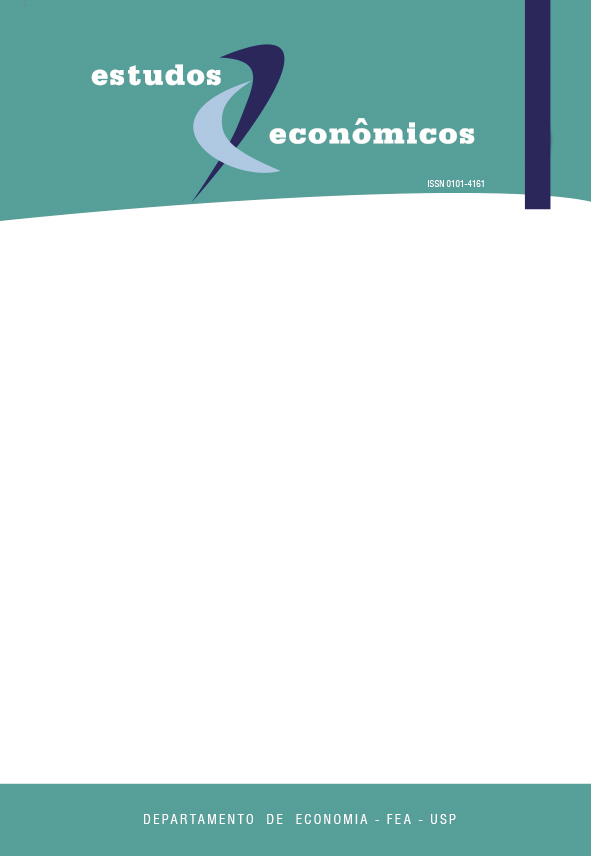Ciclos clássicos num ambiente de racionalidade limitada
DOI:
https://doi.org/10.1590/S0101-41612003000400004Keywords:
growth cycle, evolutionary game, bounded rationalityAbstract
This paper starts from the macrodynamical model developed by Richard M. Goodwin, which was first shown in the seminal paper A Growth Cycle (Goodwin, 1967). In this model it was described an interaction between income-distribution and capital accumulation that generates a growth cycle swinging along a balanced growth path. The objective of this work is to investigate the possibility of existence of goodwinian cycles with heterogeneity in wage and in profit rates. This task is carried out considering the competitive process among workers within a context of bounded-rationality. The competitive process was modelled on the bases of two tools: (i) islands´s allegory which has been broadly adopted in the modern macroeconomics in order to apprehend situations of imperfect information; and (ii) the analytic instruments developed by the evolutionary game theory applied to the social environment. The model built combines Goodwin´s model with a stylized formalization of the workers flow as a process of imitation within a context of bounded-rationality (social-based replicator dynamics). In this model two results are demonstrated: the possibility of the economy not converge to a long run equilibrium and the possibility of the economy to present a goodwinian cycle with heterogeneity in wage and in profit rates.Downloads
References
GOODWIN, R. M. A growth cycle. In: FEINSTEIN, C. H. (ed.), Socialism, capitalism and economic growth: Essays presented to Maurice Dobb. Cambridge: Cambridge University Press, 1967.
GOODWIN, R. M.; KRÜGER, M.; VERCELLI, A. (eds.). Nonlinear models of fluctuating growth. Berlin: Springer-Verlag, 1984. (Lecture notes in economics and mathematical systems, n. 228).
GUCKENHEIMER, John; HOLMES, Philip. Nonlinear oscillations, dynamical systems, and bifurcations of vector fields. 3. ed. New York: Springer-Verlag, 1990.
HOFBAUER, J.; SIGMUND, K. Evolutionary games and population dynamics. Cambridge: Cambridge University Press, 1998.
SATO, Yoshikazu. Marx-Goodwin Growth cycles in a two-sector economy. Zeitschrift für Nationalökonomie, v. 45, n. 1, p. 21-39, 1985.
SAMUELSON, L. Evolution games and equilibrium selection. Cambridge: MIT Press, 1997.
SILVEIRA, Jaylson Jair da. Ciclos goodwinianos e o processo de concorrência num ambiente de racionalidade limitada: uma análise a partir da teoria dos jogos evolucionários. 2001. Tese (Doutorado) - Instituto de Pesquisas Econômicas, Universidade de São Paulo, São Paulo.
VEGA-REDONDO, F. Evolution, games and economic behaviour. Oxford: Oxford University Press, 1996.
WEIBULL, J. W. Evolutionary game theory. Cambridge: MIT Press, 1995.
Downloads
Published
Issue
Section
License
Copyright (c) 2003 Jaylson Jair da Silveira

This work is licensed under a Creative Commons Attribution-NonCommercial 4.0 International License.
By submitting an article, the author authorizes its publication and attests that it has not been submitted to any other journal. The original article is considered final. Articles selected for publication are proofread for grammatical and orthographic errors. The journal does not pay rights for published articles. The Institute of Economic Research from the School of Economics, Business and Accounting of the University of São Paulo (Instituto de Pesquisas Econômicas da Faculdade de Economia, Administração e Contabilidade da Universidade de São Paulo) owns the journal's copyright.




